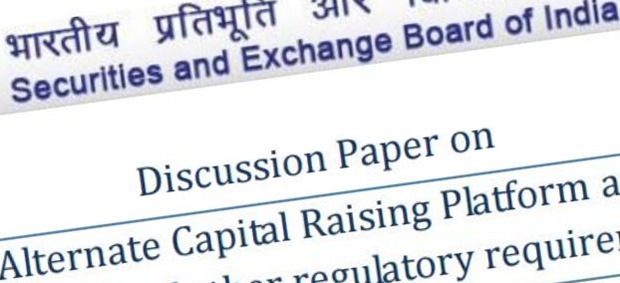SEBI Is Working on ‘Alternate Capital Raising Platform’ For Indian Startups

Securities & Exchange Board of India (SEBI) is working on a new set of guidelines which will allow startups to raise funds from the market, without opting for an IPO or Initial Public Offering. Termed as ‘Alternate Capital Raising Platform’, this new protocol of raising funds will provide an option for angel investors, Venture Capital funds, HNI etc to make informed decision about investments.
In March this year, SEBI had published a discussion paper titled: “1. Alternate Capital Raising Platform and 2. Review of other regulatory requirements” which sough public’s opinion on their proposals. The deadline for sending in reviews expired on April 20th, and as per PTI’s notification, SEBI will introduce the new norms by end of this month or early next month.
Need for a new platform for raising funds in India
SEBI observed that due to tough rules of listing, which startups are not able to meet, foreign locations such as Singapore and Hong Kong are fast becoming a preferred location for raising funds. To stop this outflow, some drastic changes have been proposed for ‘Alternate Capital Raising Platform’ for SMEs, which would be way different from IPO, but would act like one.
Similarly, SEBI acknowledged that the new age, knowledge based products are not understood by a large majority of investors, which deter them from investing. Citing examples of USA, Europe and China, where such products receive greater acceptance and investments, SEBI has highlighted the need for a similar capital market which recognizes and encourages entrepreneurs and innovators.
The New Listing Rules for Startups
Some of the major changes announced:
- Pre-issue capital is expected to be locked-in for a period of 6 months, against 3 years which is the norm for normal IPOs. This will allow the promoters to use the funds quickly and easily
- Disclosure of objectives and business model will be made easier for startups. Only the broader objectives need to be shared, as against a detailed and pro-longed documentation which is currently required.
- Retail investors would not be allowed to invest in these startups, considering the risks involved. Only HNIs, Venture Capitals and Angel Investors would be eligible to invest in this alternate platform
- Raising of capital would be allowed on Institutional Trading platform (ITP). This new proposed platform will have two categories of investors – Qualified Institutional Buyers (QIB) and Non-Institutional Investors (NII).
IPO Route Is Complex & Crowded
This is certainly one of the most exciting news for an entrepreneur, as raising funds via IPO route has some of the most stringent and tough rules, and the complexity of rules and regulations often deter small and medium sized startups from listing their firms.
However, having said that, India is witnessing a flurry of IPO offers this year. As per the number of applications for IPO submitted to SEBI this year, it is expected that Indian companies are looking to raise close to Rs 25,000 crore worth of funds from IPO this financial year. In the next 3-4 months, 11 companies will offer their shares to the public via IPO route, which is expected to raise close to Rs 5000 crore.
However, small and medium sized startups are left out due to the norms and regulations. Last year, around 38 SME IPOs were able to generate only Rs 250 crore, whereas more than Rs 13000 crore worth of investments were executed by VCs and Angel Investors in this sector last year!
We hope that the new guidelines for listing and capital platform for startups help the entrepreneurial community and enable more innovations and more success.

would like you do do a workshop on SEBI guidelines for funding start-ups .